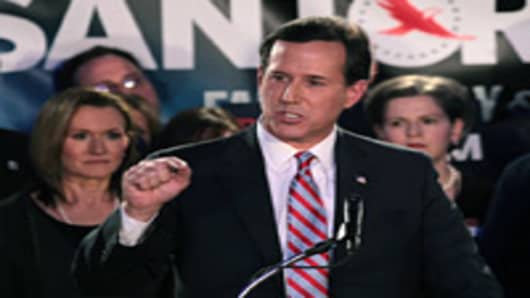took Rick Santorum to task Wednesday for his corporate tax cut proposal.
This strange turn of events came about because the WSJ editors have joined the Occupy Wall Street movement. They’re still in favor of cutting corporate taxes, presumably. They just don’t like the former Pennsylvania senator's tax cut.
Santorum proposes far deeper cuts than Mitt Romney, who favors cutting the corporate tax rate from 35 percent to 25 percent. Santorum would call all the way down to 17.5 percent for most companies—and all the way down to zero for manufacturing companies.
This favoritism irks the WSJ’s editorial page.
“The justification for this favoritism seems more political than economic, a play for blue-collar voters who often work in manufacturing,” they argue. “How will Mr. Santorum distinguish this from President Obama's favoritism for Solyndra or electric cars?”
I get the feeling that this isn’t really all the WSJ is objecting to.
If you could show polling data that revealed the public was very much able to distinguish between the Obama administration’s attempts at economic micro-management and the sectoral favoritism of Santorum, the WSJ would still object.
They just don’t like an economic policy that picks favorites. Using the tax code to nudge the economy back toward manufacturing seems like a violation of free-market principles to them. It reminds them of protectionism.
This isn’t really a deplorable position. There are a great many reasons to be suspicious of anything that smacks of government planning.
But the WSJ is wrong in assuming that taxing everyone the same is the “market-neutral” or “free-market” approach.
It’s all too possible that manufacturing is less able to bear the burden of corporate taxes than other sectors of the economy. One reason: it faces more competition from abroad. In other words, part of the decline of American manufacturing may be because the government imposes a tax burden that makes it uncompetitive.
If this analysis is right, we have a tax code that favors sectors not challenged by imports and foreign competition over sectors that are.
Why is this favoritism any better than that proposed by Santorum?
If the decline of manufacturing is driven by taxes rather than market forces, then removing the decline-inducing taxes actually restores balance in the economy. It brings us closer to a free-market result.
(Incidentally, if the decline isn’t caused by taxes, then there’s no harm in Santorum’s plan. Manufacturing will just keep declining.)
The only note of caution I’d sound here is that Santorum’s favoritism is easily gamed. If you reduce the corporate tax rate to zero for “manufacturers,” you’ll quickly find that almost every company in the United States is a manufacturer. McDonald's — it manufactures hamburgers. Starbucks — cups of coffee. Hedge funds — well, I’m pretty sure they’ll start making something.
This, of course, wouldn’t be a catastrophe. Americans are already over-taxed. If we accidentally eliminated the corporate tax altogether while trying to help out the manufacturing sector, that would be a happy accident.
Questions? Comments? Email us atNetNet@cnbc.com
Follow John on Twitter @ twitter.com/Carney
Follow NetNet on Twitter @ twitter.com/CNBCnetnet
Facebook us @ www.facebook.com/NetNetCNBC



